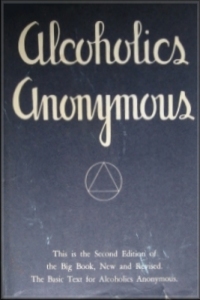
Why did Alcoholics Anonymous start when it did? Alcoholics Anonymous started in the 1930s because the timing was just right. The US was coming out of the Great Depression, Prohibition had just ended, drinking was becoming a societal problem, the media seized upon it, and AA saw alcoholism as an illness, not a moral failing.
Alcoholics Anonymous started because a stockbroker called Bill Wilson met a Doctor called Robert Smith, and they realized that they would have more success staying sober if they worked with other people. Bill W was very shy and suffered from anxiety and panic attacks. Very early on, he learned that drinking could help with those, and he gradually turned more and more to alcohol. He became a stockbroker, but his drinking was so bad that he couldn’t do his job, and his reputation was ruined. He almost lost his wife as well. He went to rehab, but it never worked. He heard of a group called the Oxford Group, that was a Christian group that had been founded in 1921. The Oxford Group wasn’t about not drinking; it was about all sin and living a good life. It did have a few ideas that Bill W would go on to use in AA. One of them was confessing sins to the other people. Bill W kept drinking and was admitted to the hospital. While there, he says that he saw a bright light, which he saw as a sign from God. He quit drinking that day. Once he was out of the hospital, he joined the Oxford Group, hoping it would help him to stay sober, and although he didn’t drink, he could see other people trying to get sober and not succeeding. Shortly after, Bill W was tempted to drink again, and he decided that helping someone else to stay sober would help him. He called other members of the Oxford Group and ended up talking to an alcoholic doctor called Doctor Bob Smith. They got together and they were able to help each other. They both realized that what they had found could work for other people, and so they started to meet with other alcoholics. Word slowly spread, and in 1938, they published the book Alcoholics Anonymous, known as the “Big Book”, with the famous 12 steps in it. People who visit Alcoholics Anonymous obviously do so anonymously, so there is no way of knowing exactly how many people the program has helped, but it is estimated that the program has helped over two million people become sober.
So, why did Alcoholics Anonymous take off so rapidly? There have presumably been other groups of people trying to quit drinking before AA came on the scene. Why was it so successful when other groups were not? Would it have taken off if it had been ten years earlier? There are several reasons. The first is the end of Prohibition. Prohibition was a law banning alcohol that was brought in in 1920 and repealed in 1933. It made it illegal to sell alcohol in any establishment. The idea was to eliminate drinking and drunkenness, but it probably had the opposite effect. Illegal alcohol distribution networks popped up. (This is how Al Capone got rich). People started drinking alcohol that wasn’t necessarily the safest and was probably quite strong. One thing that Prohibition did was drive alcohol drinking indoors, stigmatize drinking, and probably made more alcoholics than if it hadn’t been introduced. When Prohibition was repealed, people realized that the law couldn’t fix alcoholism, and the country was ready for another solution.
Another reason was the end of the Great Depression. It had started with the Wall Street crash in 1929 and wouldn’t fully end until the start of World War 2. Things were starting to slowly get better through the second half of the 1930s, but a lot of people still had no money and no hope. A lot of people turned to drink, and often they had nowhere to live, so alcoholism was a very visible problem that people couldn’t ignore. Many people were looking for hope and a structure that they didn’t have.
A third reason was the media. Perhaps they were reacting to society, but they seized upon the newly founded Alcoholics Anonymous and the book they had published. A local newspaper published many positive articles, which increased the number of people attending. Then, Liberty magazine, which was said to be the second largest publication in America, publicized AA. That encouraged John D Rockefeller to back AA, and even more people began to attend and spread the word. Then, the Saturday Evening Post, which was a weekly magazine at the time with a huge readership, published an article on Alcoholics Anonymous. That brought in even more people.
The fourth reason is probably that Alcoholics Anonymous didn’t see alcoholism as a moral problem. They saw it as an illness. They never went so far as to call it a disease because a disease usually has a singular cause. They called it an illness in the way that heart disease is an illness. There is no single cause of heart disease, and there is no single cause of alcoholism. This approach was refreshing to many people who had been told that they had moral shortcomings.
There is no way of knowing if Alcoholics Anonymous would have taken off if Bill W had met Dr. Bob 10 years earlier. The timing was perfect in the mid-1930s. The stars aligned. And Alcoholics Anonymous has saved millions of people. And this is what I learned today.
Sources
https://www.aa.org/the-start-and-growth-of-aa
https://en.wikipedia.org/wiki/Alcoholics_Anonymous
https://en.wikipedia.org/wiki/Oxford_Group
https://en.wikipedia.org/wiki/Bill_W.
https://www.aa.org/the-story-behind-Jack-Alexanders-article
https://en.wikipedia.org/wiki/The_Saturday_Evening_Post
https://en.wikipedia.org/wiki/Liberty_(general_interest_magazine)
Image By User:Bikinibomb self-photographed., Fair use, https://en.wikipedia.org/w/index.php?curid=14121761
